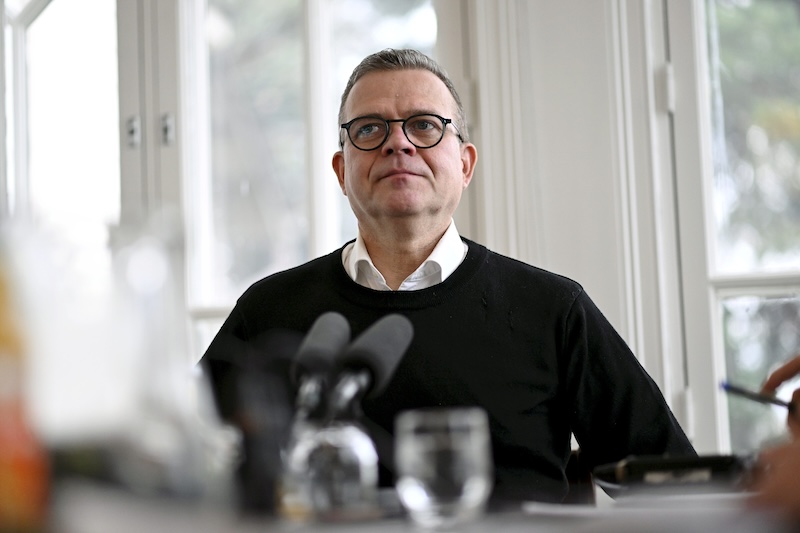Finland’s Prime Minister, Petteri Orpo, has reaffirmed his government’s commitment to pension stability, support for Ukraine, and the continued closure of the country’s eastern border with Russia, while calling for realistic national debate on the economy and future reforms.
Speaking on Sunday during Yle’s traditional weekly interview, Orpo said Finland must “keep all options open” for long-term fiscal reform, including the possibility of reviewing the pension age. However, he ruled out any cuts to pension benefits during his current term, describing the decision as a “value choice.”
“Our decision has been not to interfere with pensions,” he stated. “Eventually we must ask if the retirement age increases fast enough. That must be evaluated continuously.”
He noted that the existing life expectancy coefficient already raises the pension age incrementally in response to demographic trends but suggested the system may need ongoing adjustments to remain sustainable.
Orpo said the government had strengthened the pension system by around one billion euros and insisted no measures had been taken that would reduce benefits. However, he warned that the next administration would likely need to identify about six billion euros in spending adjustments to stabilize public finances.
He emphasized that economic growth alone would not resolve Finland’s structural budget challenges, underscoring the importance of the government’s newly introduced “debt brake.”
Support for Ukraine and Border Policy
On foreign policy, Orpo reaffirmed Finland’s firm backing for Ukraine and described Russia’s military setbacks as evidence of “strategic progress” for Kyiv. He highlighted China’s decision to limit oil imports from Russia as another key signal of shifting global dynamics.
“Russia is not advancing on the front, and Ukraine’s ability to strike inside Russia has improved,” he said.
The prime minister expressed disappointment over the European Council’s failure to reach a consensus on using frozen Russian assets to fund Ukraine’s defense. “Europe has not, at any stage, been able to respond adequately to Ukraine’s needs,” Orpo said, adding that Finland was ready to “share risks” to move the proposal forward.
Turning to border security, Orpo confirmed that Finland’s eastern border with Russia would remain closed until further notice. He said partial reopening could be considered only if Moscow halted the flow of undocumented migrants.
“Currently, there is no indication that they plan to change,” he stated, referencing recent illegal crossings in Ilomantsi and warning of continued pressure at the frontier.
Domestic Policy and Economic Outlook
Domestically, Orpo dismissed proposals by his coalition partners, the Finns Party, to restrict health and social services for foreign residents, saying all legal residents have equal rights to public services.
“There are hundreds of thousands of people with foreign backgrounds in Finland. They have the right to be here, and the right to services,” he said.
He also acknowledged persistent challenges in healthcare delivery, particularly in regions affected by financing shortfalls and salary hikes. “The situation has improved overall, but there are still areas with major problems,” he noted, stressing that service levels must not collapse due to staff reductions.
The prime minister maintained his government’s goal of creating 100,000 new jobs by the end of the term, despite projections from the Ministry of Finance suggesting the target may not be met. “We are still working toward that goal every day. We don’t give up,” he said.
Climate Goals and Opposition Response
Orpo reaffirmed Finland’s carbon neutrality target for 2035 but admitted that declining carbon sinks posed a “massive challenge.” He said the government was exploring new methods to offset the impact without imposing additional restrictions on transport or housing sectors.
The opposition, however, was quick to criticize the prime minister’s remarks. Social Democratic MP Tytti Tuppurainen accused Orpo of “avoiding responsibility” and leaving difficult fiscal and social decisions for the next government.
“It’s clear the government is out of ideas, and the prime minister doesn’t even try to solve problems anymore,” she said in a statement, citing growing internal divisions within the ruling coalition.
Orpo declined to confirm whether informal talks about future coalition arrangements had begun, insisting there were “no sauna talks” underway. He concluded the interview on a cautiously optimistic note, calling for more balanced public discourse.
“Negative talk does not help anyone,” he said. “There are positive signs, and it is important that people are aware of them.”


